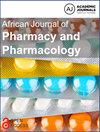In vivo studies of the immunomodulatory effect of aqueous extract of Artemisia herba alba
引用次数: 0
Abstract
Historically Artemisia herba alba (AHA) is widely used in traditional Moroccan medicine. Few studies have been carried out to confirm its traditional use, in particularly immunological studies and to the authors’ knowledge; no study has treated the in vivo immunomodulatory effect of AHA aqueous extracts. This work was established to assess the immunological effects of AHA, including the humoral and cellular immunity effects in vivo. The immunomodulatory effect was assessed by measuring the titer of specific antibodies by the agglutination technique after immunization of Wistar rats with sheep red blood cells, while the pro-inflammatory effect was performed using a carrageenan-induced rat paw edema model. Administered AHA’s aqueous extract (AE) appears to have significantly (p < 0.01) stimulated the production of anti-SRBC antibodies with a dose-dependent effect compared to the control. These results were confirmed by a significant increase in the levels of white blood cells in particular neutrophils, lymphocytes, monocytes and eosinophils (p<0.05) for the doses 0.5 and 1 g/ml/bw. For the same doses of the extract, a proinflammatory effect was observed by the size of edema and the presence of very dense inflammatory infiltrate made up of lymphocytes, plasma cells and polymorphonuclear neutrophils. The AHA’s AE have shown an important immunomodulatory and pro-inflammatory activities in vivo by enhancing the production of antibodies and the inflammatory reaction.白蒿水提取物免疫调节作用的体内研究
历史上,白蒿(AHA)被广泛用于摩洛哥传统医学。据作者所知,很少有研究证实其传统用途,特别是在免疫学研究中;没有研究处理AHA水提取物的体内免疫调节作用。本研究旨在评估AHA的免疫作用,包括体内体液和细胞免疫作用。在用绵羊红细胞免疫Wistar大鼠后,通过凝集技术测量特异性抗体的滴度来评估免疫调节作用,而使用卡拉胶诱导的大鼠爪水肿模型来进行促炎作用。与对照组相比,施用AHA的水提取物(AE)似乎显著(p<0.01)刺激了抗SRBC抗体的产生,并具有剂量依赖性效应。这些结果通过0.5和1g/ml/bw剂量下白细胞水平的显著增加得到证实,特别是中性粒细胞、淋巴细胞、单核细胞和嗜酸性粒细胞(p<0.05)。对于相同剂量的提取物,通过水肿的大小和由淋巴细胞、浆细胞和多形核中性粒细胞组成的非常密集的炎症浸润的存在,可以观察到促炎作用。AHA的AE通过增强抗体的产生和炎症反应,在体内显示出重要的免疫调节和促炎活性。
本文章由计算机程序翻译,如有差异,请以英文原文为准。
求助全文
约1分钟内获得全文
求助全文

 求助内容:
求助内容: 应助结果提醒方式:
应助结果提醒方式:


